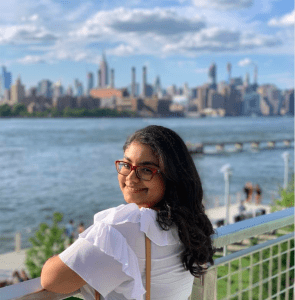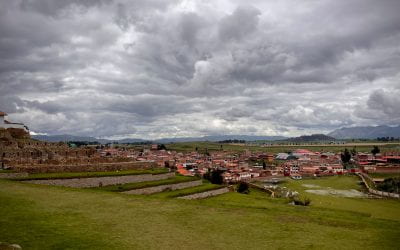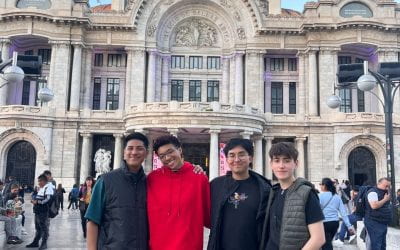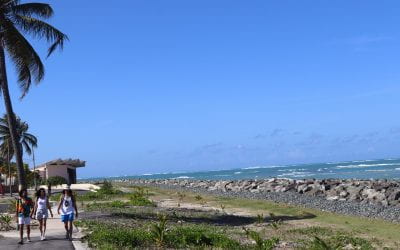
About the Author
Sarah Deonarain is a sophomore in Currier house originally from Queens, NY. She is concentrating in Economics. She writes for the Harvard Political Review and enjoys policy research.
We the People
Constitutional Reform and Immigration in Chile
This January, I had the pleasure of interning virtually with the Constitutional Lab at the Diego Portales University based in Santiago, Chile. Driven by a desire to attain fluency in Spanish and having a deep passion for international development, this internship perfectly meshed the two. Out of this experience, I would gain invaluable research skills, improve my proficiency in Spanish, and develop strong relationships with my team at the Lab.
From a young age, I aspired to become an immigration lawyer and share the stories of immigrants with the world, fight against an unjust and broken system in the United States, advocate for human rights and humane treatment of refugees internationally, and serve migrant communities in Latin America. Through the Constitutional Lab, I was able to conduct and disseminate research to the Chilean public on immigration and human rights law to inform them about the constituent process and migration, an area going unnoticed as the country prepares to rewrite its Constitution, despite the economic and humanitarian crises ravaging Venezuela and Central America.
Although I was nervous about speaking Spanish in a fast-paced, academic environment, I was provided with resources from DRCLAS that helped me practice speaking Spanish. There were also events as part of the remote winternship program that helped me practice my listening skills as well as further educate me about art, politics and gender in Latin America. Most importantly, this internship taught me to be open and communicative about my experience by voicing my opinions and speaking up when I didn’t understand something. It equipped me with the confidence to continue speaking Spanish and empowered me to continue seeking opportunities in Latin America.
I was most nervous about my thoughts getting lost in translation, especially since the initial stages of my research involved reading complex legal documents and designing a survey, so I was concerned that my team would misunderstand me and this would slow down our progress. However, staying on top of the new vocabulary I encountered, reading articles and watching videos in my free time to stay informed about the latest developments in Chilean politics, and regularly connecting with my mentor alleviated worries about my Spanish-speaking abilities and allowed me to grow comfortable with my team and produce quality work.
As a result, in this historic moment, I surveyed more than 500 political candidates in Chile and conducted interviews with a range of academic and non-profit actors in the Chilean sociopolitical landscape. Through my research, I impacted the ongoing constitutional discussion in Chile and impressed into the minds of Chileans the dignity and worth of immigrants by producing a policy paper that described the findings of my research and revealed the political tendencies of current candidates running for office (to be elected in April).
To elaborate, my internship began with research on the rights of immigrants under the current Constitution in Chile, which included a reading of legal documents and articles by Chilean scholars in the field of constitutional law. This was an incredible moment for me, as I previously never thought I would be able to operate at such a high level of Spanish!
Next, I designed a survey, focused on candidates running for election at the Convention in April, with the intention of collecting data on their views on immigration. The survey asked them what rights the candidates thought should be given to immigrants in the new Constitution, the language used to refer to immigrants in the new Constitution, and general policies related to immigration in Chile. From designing this survey, I learned about the stratification of Chilean politics into listas or parties, the state of immigration politics in Chile, the intersection between immigration and other issues, such as health, education, job creation, and racism/discrimination, and intra-immigration problems, such as the social, civil, and political rights of immigrants, national security, and cultural assimilation. Moreover, I learned about several international treaties that shape laws around immigration in Chile, and I discussed the rights of immigrants to be represented in the New Constitution, including equality before the law, freedom of conscience, freedom of expression, right to vote locally/nationally, right to be elected, and right to not be discriminated against. Lastly, I even debated the language to be used in the New Constitution when referring to immigrants, such as “migrants” or “foreigners” or “neighbors”.
Then, after several revisions, I sent the survey to more than 500 candidates. In addition, I interviewed key actors in the Chilean political landscape to collect qualitative data on immigration and the constitutional process. Interviewees included professors of legal clinics at universities throughout Chile, directors and presidents of organizations that serve immigrants and focus on migration, and candidates running for public office. Finally, my investigation culminated in an analysis of the results in a policy paper published by the Lab.
Overall, this internship has greatly strengthened my skills in speaking, reading and writing in Spanish, working in teams (especially in the remote and virtual format), and doing research. Additionally, this internship exposed me to work in public, NGO, and academic sectors, and helped clarify my professional interests in international development and law in Latin America. I am deeply honored and grateful to have had this opportunity through DRCLAS, and I hope that in my future career I will be able to work in Latin America, where I can immerse myself in its rich languages, cultures and history, as well as participate in reforms and effect change for the greater social good of the region!
More Student Views
Andean Cultural Landscapes in Danger: The Chinchero International Airport
English + Español
Cusco stands as one of the most culturally and ecologically captivating regions globally.
Blossoming Bonds: Beauty and Belonging in Mexico
When I heard the news about my upcoming trip to Mexico, a surge of excitement coursed through me, and I immediately felt the urge to share this exhilarating news with my close friends and family.
Weapons of Mass Construction: Building a Puerto Rico for the People
I zip up my raincoat and turn on my headlamp as we tread along a damp trail in El Yunque National Rainforest, Puerto Rico.




